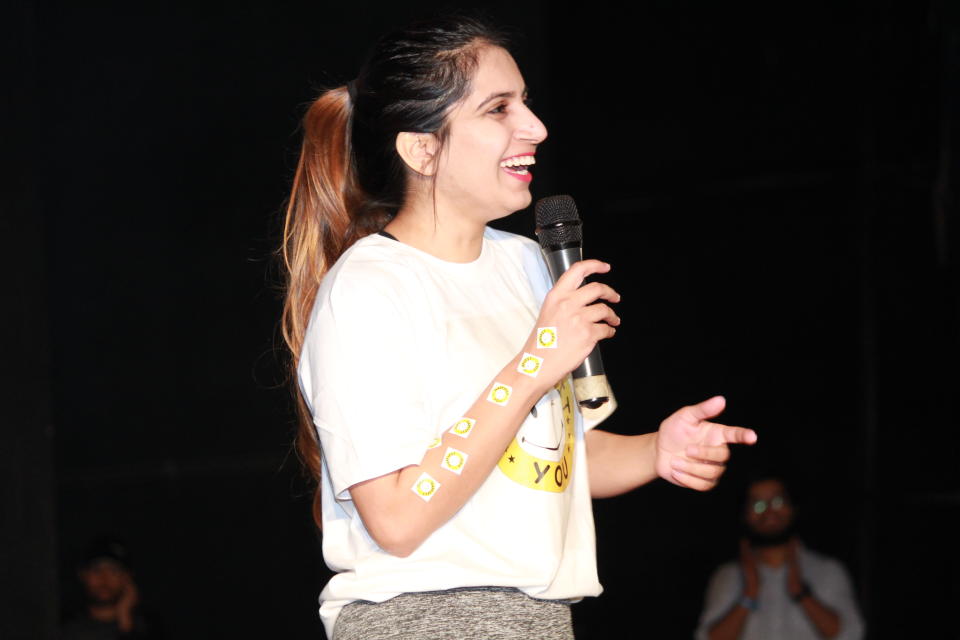Can you really train yourself to be happy?

The true meaning of life has been debated through the years, with no one being able to give a clear answer.
However, one thing that most people agree on is that the a key life goal is to be happy. That, unfortunately, is often easier said than done.
But what if you could train yourself to be happy?
Enter, Anshula Verma: a 24-year-old who has dedicated her career to helping others be happy.
Anshula studied under Dr Tal Ben-Shahar, a lecturer at Harvard University whose positive psychology courses have been the most popular in the university’s history.
She took classes at his Happiness Studies Academy and now is a fully-fledged ‘happiness coach’ on a mission to teach people how to change their mindset.

“The biggest cause of unhappiness is unrealistic expectations, comparing our lives to others, not having enough human connection and most of all - lacking and not showing enough human emotions,” says Verma.
“In the modern world, a digital connection is stronger than human connections and individuals have stopped valuing human emotions which further results in the world being stressed, unhappy and cold.”
The Harvard Study of Adult Development, which started in 1938 and is one of the longest running studies in the world, followed 724 men throughout their lives, and found that close relationships, more than money or fame, are what keep people happy.
READ MORE: British people reach peak happiness at 68, research finds
How does a happiness class work?
You start by changing your mindset, says Verma.
One of the ways she does it is by tackling people’s unconscious bias and judgement they may have of others - with a workshop about boats.
Verma divides her clients into groups, hands everyone a piece of paper and tells them to make the most beautiful boat they can. This could be a sculpture, a drawing or any other creative method they come up with.
“What happens is that we all think from our point of view of our definition, what may be beautiful to me may not be to someone else,” she says.

Verma said the activity made people realise the ways in which they may have criticised people without understanding their issues or problems and how learning not to do that has lead them being happier within themselves.
“Through our workshops and programmes we have touched more than 12,200 people,” she said.
“They focus on all areas of wellbeing; not just mental, but also emotional, physical, spiritual and environmental.”
Though she has a wide range of classes for all sorts of people, they do cost money, 2000 INR (£23) - begging the question whether people who can pay for these privileges are the only ones who can be happy.

“For people who cannot afford them, I do not charge them,” Verma explains.
“Like when I am conducting a workshop for people in villages, or tribal regions, I do not charge them. Because at the end of the day you have to give back to society and everyone deserves happiness.
“Most of all, it is in these times that you learn a lot about life lessons and life hardships from others’ stories.”
How can you train yourself to be happy?
We obviously can’t all attend Verma’s classes in India, but she does have some takeaways each one of us can action in our lives.
“Always have a vision or a goal in life, so that you channel your energy in the right direction. Analyse the positives and shortcoming of oneself,” she suggests.
“Accept the flaws and strive to break the barriers to create the best life. Add value to others lives by being compassionate, kind, and non-judgemental.
“Lastly, live in the present and seize every moment.”
READ MORE: Marriage makes men happier than women
Dr Sheri Jacobson, a retired psychotherapist and founder of Harley Therapy, agreed strongly with Verma’s opinions, saying: “The items on her list [of what makes people unhappy] ring very true.
“Many people suppress their true thoughts, and therefore one of the core areas of therapy is to express your feelings so that they don’t erupt elsewhere.
“And we do compare ourselves to others, subconsciously or not, even just by virtue of scrolling past their images on our social medias.”
READ MORE: Man argues women wearing lipstick is too 'sexual' for work
“[In now to train yourself to be happy] what she talks about are gratefulness, compassion and mindfulness, just phrased differently,” she added.
“These are all incredibly important areas, and places we work on extensively in therapy. Out of positive and negative situations, the human mind is naturally drawn to the negatives, and so we work to change that mindset.
“The only thing I would hesitate to use is the word ‘goal’, as once you reach it, you could have a feeling of “now what”. Instead, having a ‘purpose’ in both your personal and working life would be better.
“For being so young she sounds wise beyond her years.”



